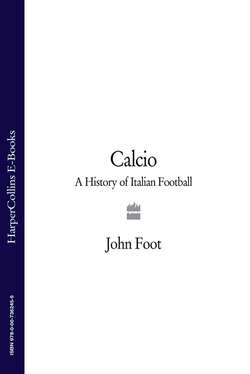Читать книгу Calcio: A History of Italian Football - John Foot - Страница 11
Paleo-calcio. Rules, Managers, Foreigners, Sundays
ОглавлениеThe early game in Italy – which we might call paleo-calcio – was poles apart from the sport you witness if you turn on your satellite TV station today, or even pop round to your local football pitch. There were no managers of any sort (although people similar to managers began to emerge quite quickly, in some accounts as early as 1901), no training beyond a few shots with the ball, and the players were all, to a man, amateurs. There were no stadiums, no real tactics, the ball was heavy and goalkeepers didn’t even attempt to catch it. Punching or kicking out were much preferred. Kit was made up of long-sleeved shirts, often with buttons. Many essential items were imported from England – balls, shirts, boots. Shorts were long, and trousers were often worn, as were caps. There were no changing rooms, so players usually turned up, and went home, already changed.
Many rules in place at the birth of calcio were dissimilar to those that govern today’s game. A player was offside if, when the ball was played, there were fewer than three players between him and the goal and until 1907, the offside rule applied to the whole pitch. After that date, you could not be offside in your own half. For many years, a draw usually led to a replay, not extra-time. Disciplinary rules were rudimentary. Pitch invasions led to replays, not sanctions (thereby encouraging more pitch invasions). There were no shirt numbers until the 1939–40 season and no substitutes at all until 1968. Early Italian football history was also dominated by foreign players, presidents, clubs, entrepreneurs, referees and words, and above all by the English, the Swiss, the Germans and the French.
From the start, matches were often played on Sundays, despite the fact that Italy was a Catholic country. The reason for this anomaly was simple. Most people worked on Saturdays, and the battle for an ‘English Saturday’ – one without work – was one of the historic demands of Italy’s nascent trade union movement in the early twentieth century. Later, the Church was to complain about this tradition (which is also true of Catholic Spain). Until the 1990s, when Pay-TV destroyed the rites and rhythms of the great Italian football Sunday, the Sunday afternoon match formed a central part of Italian culture. Some fans went to games, partaking in the physical act of watching their team. Others hung around outside stadiums, trying to get in free or just lapping up the atmosphere. Many others simply waited for news, or visited bars. Once radio became widespread, the little transistor became a key element of the classic Sunday family outing, pressed as it often was to the ear of the father, or listened to through a primitive plastic earpiece. With the advent of TV, the afternoon outing had to be cut short in order to get back in time for Ninetieth minute, a programme with short reports on all games, transmitted at about 18.30.
